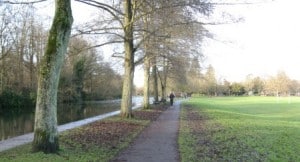Support us from £3/month
We deal with almost 1000 cases a year assisting communities, groups and individuals in protecting their local spaces and paths in all parts of England and Wales. Can you help us by joining as a member?
The government proposes to remove democratic protection from open spaces threatened with compulsory purchase. The House of Lords will debate these plans, which are in clause 22 of the Growth and Infrastructure Bill, on Monday (4 February).
We are urging members of the House of Lords to oppose clause 22 because it puts open spaces everywhere at risk.
At present, when a local authority or statutory undertaker seeks a development consent order which involves the compulsory purchase of open space, either it must provide suitable land in exchange or the order is subject to the consent of parliament under special parliamentary procedure (SPP).(1) This is in recognition of the special qualities and value of open space.
The Growth Bill says that when there is no suitable land to give in exchange for the open space, or the exchange land is too expensive, the Secretary of State for Communities and Local Government may himself decide that the order need not be subject to SPP, thus circumventing parliament.
Open space is defined as ‘any land … used for the purposes of public recreation’, in other words the many thousands of acres of countryside which were painstakingly mapped under the Countryside and Rights of Way Act 2000, and the hundreds of sites which people enjoy by custom for informal recreation.
Says Lord Faulkner of Worcester, who is calling for clause 22 to be removed from the Growth Bill: ‘I am concerned that this provision will result in significantly less parliamentary scrutiny on planning matters which have a direct impact on people’s lives. Open spaces are cherished by local people and should not be taken for some other purpose without either suitable land being given in exchange or the plans being subject to parliament’s scrutiny.’
Adds Kate Ashbrook, our general secretary: ‘The current law, which protects open spaces, has existed since its introduction in the Acquisition of Land Act1946, in which the Open Spaces Society played a part. It is not used often, so we see no need to change it. But it is there as an important protection when major development threatens land which the public enjoys for recreation.
‘In 1965 Wycombe Rye in High Wycombe, Buckinghamshire, a much-loved open space close to the town, was saved from a road scheme because there was no exchange land so SPP was invoked. The parliamentary committee rejected the scheme. It would have been tragic of the land had been destroyed; it is still extremely popular today.
‘We fear that the Growth Bill is a concerted attack on open spaces. This provision, together with clauses which threaten to debar the registration of land as a village green where it is earmarked for development, will significantly reduce the protection afforded to open spaces,’ Kate concludes.
1. Under special parliamentary procedure (SPP) the order is referred to a joint committee of both Houses of Parliament which hears the case and then reports to both Houses of Parliament. It is normal for parliament to accept the committee’s findings.

